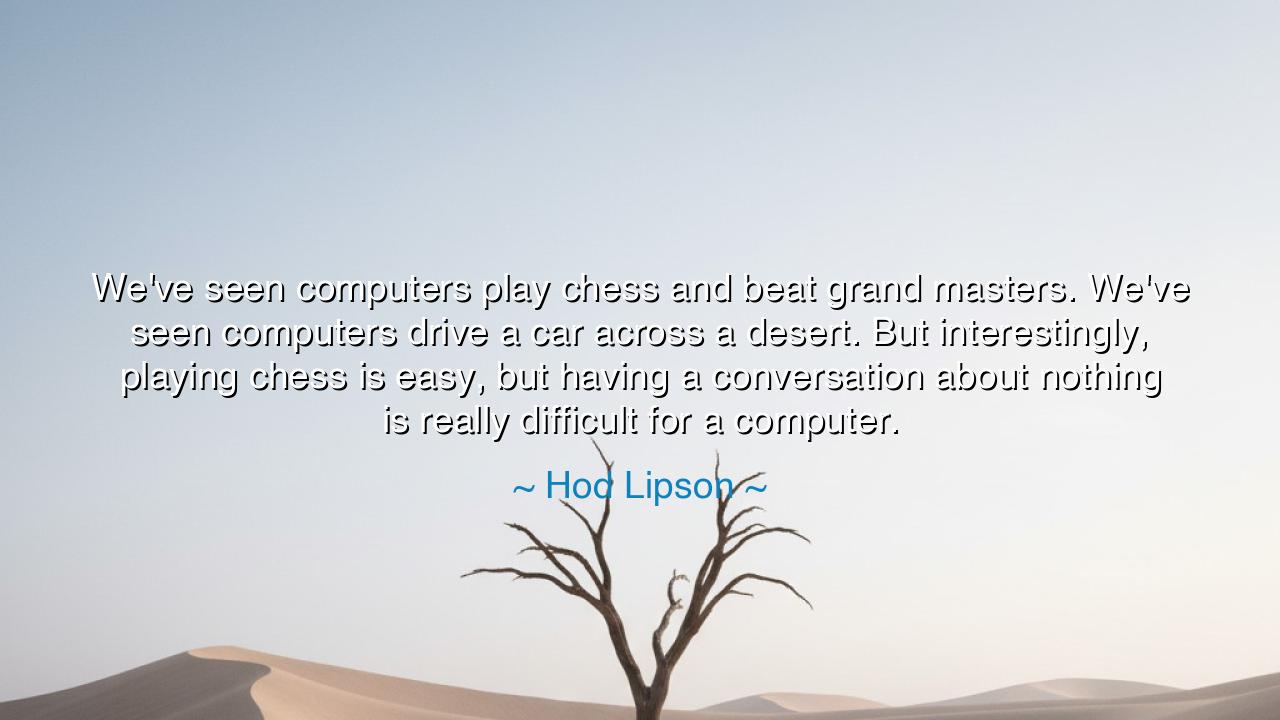
We've seen computers play chess and beat grand masters. We've
We've seen computers play chess and beat grand masters. We've seen computers drive a car across a desert. But interestingly, playing chess is easy, but having a conversation about nothing is really difficult for a computer.






“We’ve seen computers play chess and beat grand masters. We’ve seen computers drive a car across a desert. But interestingly, playing chess is easy, but having a conversation about nothing is really difficult for a computer.” Thus spoke Hod Lipson, a modern philosopher of machines, whose mind dwells where circuits and consciousness meet. His words shimmer like lightning across the landscape of our age — an age where machines grow powerful, yet remain strangely hollow. In this reflection lies a profound truth: that while the mind of the computer can master the rules of logic, it still cannot grasp the music of the human heart.
To the ancients, wisdom was never measured by speed or precision, but by understanding. The machine, with its tireless calculations, is like a clever scribe who can copy every word yet never feel the story’s meaning. It can play chess — a game of patterns and certainty — but it stumbles before the mystery of conversation, that most human of dances. For to speak “about nothing” is not to speak without purpose, but to weave the invisible threads of emotion, intuition, and shared silence. It is to sense laughter beneath words, comfort in pauses, connection without goal. These are the sacred subtleties that no code has yet captured.
When Deep Blue defeated Garry Kasparov in 1997, the world gasped. The triumph of silicon over strategy seemed like the dawn of a new dominion. But Kasparov himself, in defeat, said something remarkable: “The machine only sees positions; it never sees beauty.” He understood that while the computer conquered the board, it did not feel the game — it did not tremble with risk, delight in surprise, or suffer from doubt. The human mind, imperfect and impulsive, still holds dominion over meaning. The computer can win the battle of logic, but it cannot dream of victory.
And this is what Lipson reminds us — that the hardest thing for a computer is not to solve a problem, but to understand life. To talk “about nothing” is, in truth, to talk about everything that matters: the weather, the way light falls through a window, the memory of an old song. These are not transactions of information, but expressions of presence. In them lives the soul of companionship. The computer, with all its brilliance, cannot yet join this sacred dance, for it does not yet feel the music of existence.
There is a kind of wisdom that grows only in the soil of imperfection. When humans converse, they hesitate, laugh, misunderstand, and recover — and it is in those very flaws that intimacy is born. The computer, flawless in form, remains cold in spirit. It mirrors words, but not intention; it repeats tone, but not tenderness. Like an echo in a cavern, it can return sound but not meaning. Lipson’s insight is thus both triumph and warning — a celebration of human ingenuity and a reminder of our unique flame.
Yet we must not despise the machine. For every tool reflects the hand that forged it. The computer, mighty though it may be, is our child — a mirror of our reason, though not yet of our soul. Its limits remind us of our own essence, of what cannot be replicated: empathy, humor, wonder, and love. These are the things that no algorithm can predict, for they dwell in the depths of being, not in the rules of logic. As the ancients said, “The gods gave fire to man, but not the warmth of the sun.”
The lesson is clear, O reader of the modern age: cherish the ineffable. Do not measure yourself by the perfection of the machine, but by the warmth of your heart, the courage of your curiosity, the generosity of your words. Speak not only to inform, but to connect. Let your conversations wander like rivers — meandering, gentle, alive. For in that wandering lies the spark of humanity, the very thing that no code can imitate.
So remember Hod Lipson’s wisdom: though machines may outthink us, they cannot outfeel us. To be human is to be beautifully uncertain — to find meaning in what seems like nothing, and to build connection out of air and laughter. Treasure that gift. Guard it. For one day, when the machines have conquered every game, it will still be our voices, our stories, and our silences that hold the world together.






AAdministratorAdministrator
Welcome, honored guests. Please leave a comment, we will respond soon